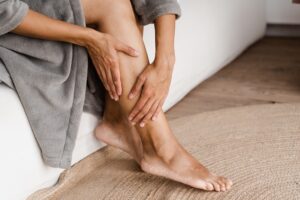When to Seek Medical Attention for Vein Issues
 Varicose veins and spider veins are more than just cosmetic concerns; they can indicate underlying health issues that require medical attention. While many people dismiss these conditions as mere aesthetic nuisances, it’s crucial to recognize when vein issues warrant a visit to a medical professional. Ignoring symptoms can lead to complications and impact your overall well-being. When should you seek medical attention?
Varicose veins and spider veins are more than just cosmetic concerns; they can indicate underlying health issues that require medical attention. While many people dismiss these conditions as mere aesthetic nuisances, it’s crucial to recognize when vein issues warrant a visit to a medical professional. Ignoring symptoms can lead to complications and impact your overall well-being. When should you seek medical attention?
1. Persistent Pain and Discomfort
If you experience persistent pain or discomfort in your legs, especially after prolonged periods of sitting or standing, it may be a sign of venous insufficiency. Varicose veins can cause aching, throbbing, or a feeling of heaviness in the legs. These symptoms indicate that blood may not be circulating properly, and seeking medical evaluation is essential to determine the cause and appropriate treatment.
2. Swelling and Leg Fatigue
Swelling in the legs, ankles, or feet can be a symptom of venous insufficiency. If you notice your legs feeling unusually tired or heavy, it could be an indication of poor venous circulation. These signs may suggest an underlying vascular issue that requires medical attention to prevent further complications.
3. Skin Changes and Discoloration
Varicose veins can lead to changes in the skin surrounding the affected area. Look out for skin discoloration, especially if it appears reddish or brown. Persistent discoloration may be a sign of venous stasis dermatitis, a condition that occurs when blood pools in the veins. If you notice any changes in your skin’s appearance, consulting with a vein specialist is crucial.
4. Open Sores or Ulcers
In advanced cases of venous insufficiency, open sores or ulcers may develop on the skin, typically around the ankles. These ulcers can be painful and slow to heal. If you notice any open sores on your legs, it’s imperative to seek medical attention promptly. Proper diagnosis and treatment can prevent the progression of the condition and promote healing.
5. Vein Bleeding
While uncommon, varicose veins near the surface of the skin can occasionally bleed. If you experience vein bleeding, apply gentle pressure to the area and seek immediate medical attention. While most cases are not life-threatening, addressing the issue promptly can prevent excessive blood loss and ensure proper wound care.
6. Changes in Vein Appearance
If you observe sudden changes in the appearance of your veins, such as increased size, new bulging, or a sudden proliferation of spider veins, it’s advisable to consult with a vein specialist. These changes may indicate a progression of venous insufficiency, and early intervention can prevent complications.
7. Pregnancy-Related Vein Issues
Pregnancy often contributes to the development or exacerbation of vein issues. If you are pregnant and experiencing discomfort, swelling, or the appearance of new veins, consult with a healthcare professional. Addressing vein issues during pregnancy is crucial for both maternal well-being and the health of the developing fetus.
Don’t Ignore Varicose Veins or Spider Veins
While varicose veins and spider veins are common, they should not be ignored, especially when accompanied by symptoms such as pain, swelling, or skin changes. Recognizing the signs and knowing when to seek medical attention is key to preventing complications and maintaining optimal vascular health. If you are experiencing any of the mentioned symptoms, don’t hesitate to reach out to Vanishing Veins Northwest. Our specialists can provide a thorough evaluation and recommend appropriate treatment options tailored to your needs. Your vascular health matters, and seeking timely medical attention can make a significant difference in your overall well-being.
Call Vanishing Veins Northwest at 425-277-8346 (VEIN) to Schedule Your Appointment Today!